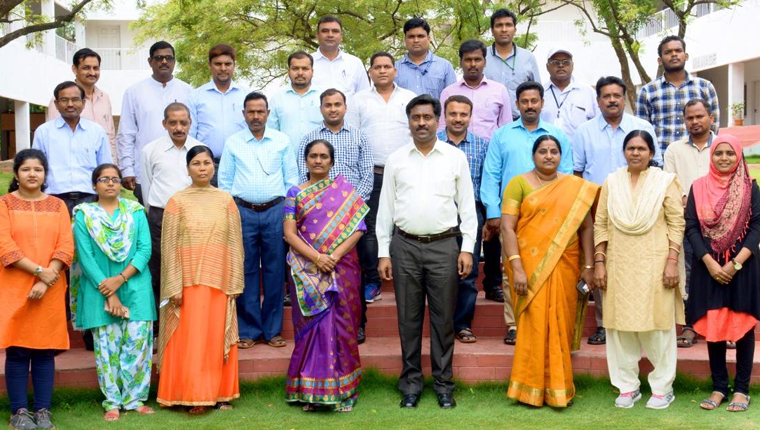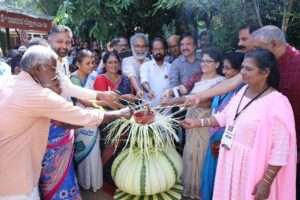 The National Institute of Agricultural Extension Management (MANAGE), organised a Training Programme on “Extension PLUS: Practicing Beyond Transfer of Technology” from 5-7 July, 2017 at Hyderabad. Miss K. Qudsiya Jamal, who participated in this training as a training facilitator, shares her experiences here.
The National Institute of Agricultural Extension Management (MANAGE), organised a Training Programme on “Extension PLUS: Practicing Beyond Transfer of Technology” from 5-7 July, 2017 at Hyderabad. Miss K. Qudsiya Jamal, who participated in this training as a training facilitator, shares her experiences here.
Extension PLUS is a framework for reforming the extension system to play new and varied roles beyond its traditional role of transfer of technology. MANAGE organised a training programme on “Extension PLUS: Practicing Beyond Transfer of Technology” from 5-7 July, 2017 at Hyderabad, to promote this framework.
PROGRAMME
Day 1: 5 July
Dr. R. Saravanan, Director, Agricultural Extension, MANAGE, gave an interesting presentation about pluralistic extension and how private and civil society extension services are currently supporting farmers.
Mrs. Jyothi Share, Consultant, MANAGE, shared experiences from the Agriclinic and Agri-business Centres (ACABC) scheme and some of the success stories documented so far from this scheme.
Mr. Sheik Akbar Ali, Entrepreneur, ‘Information and Inputs For Sustainable Aquaculture (IIFSA), shared his experience on offering fishery services to farmers. The talk was focused on the struggles he faced initially in reaching the farmers, gaining their trust and confidence as well
as delivering quality services, including e-services. It was interesting to hear how he dealt with various problems and came out successfully as an aquaculture extensionist.
Dr. Suchiradipta Bhattacharjee, MANAGE Fellow, gave a brief presentation on new challenges of present-day agriculture and the need for using the Agricultural Innovation Systems (AIS) framework, with evidence from her research work on Syestems of Rice Intensification (SRI) in Tripura.
Day 2: 6 July
Dr. C. Kathiresan, Associate Professor, NIRDPR, Hyderabad gave an informative presentation on development of agricultural extension over the years. He also presented some of the ICT applications in agricultural extension.
Dr. R. Saravanan, Director, Agricultural Extension, MANAGE, highlighted the growth of digital and social media in extension and advisory services around the globe. Further, he elaborated on various digital and social media platforms deployed by the of Global Forum for Rural Advisory Services (GFRAS), Agricultural Extension in South Asia (AESA) and some of the social media applications such as blogs, Facebook etc.
The participants visited a center of Sahaja Aaharam (promoted by the Centre for Sustainable Agriculture) which sells organic farm produce. Mr. Rajasekar, Centre for Sustainable Agriculture, gave a brief presentation about the initiative and how it supported production and marketing of organic farm products.
Dr. Sagar Deshmukh, Training Associate, MANAGE, talked about the objectives, vision, mission and focus areas of the ACABC Incubation Cell. He also briefed the audience about the distinguished features and activities of the cell.
Day 3: 7 July
Dr. P. Chandrasekara, Director, Agricultural Extension, MANAGE, narrated his experiences in promoting public-private partnerships in agricultural extension. He argued for the need to promote private extension initiatives and discussed some of the experiences with public-private partnerships in extension.
Dr. N. Balasubramani, Deputy Director, MANAGE, discussed the impact of climate change on agriculture and the role of extension in supporting climate change adaptation and mitigation.
Mr. R. Inigo Arul Selvan, AGM, NABARD, Telangana, threw light on the strategies for link credit. He shared details of recent initiatives of the Government in enhancing access to credit.
The final session of the training focused on the needs and expectations articulated by the participants in the beginning. The session was headed by Smt. Usha Rani, IAS, Director General, MANAGE, and the training facilitator presented a summary of the three-day event. The participants expressed their views and gave feedback about the training. Later, individual feedback was also solicited from each participant.
MY REFLECTIONS
The training was well planned and covered all the topics related to the training title. The lectures were informative and interactive, which helped the participants to engage with the topic. The resource persons presented relevant information, which gave participants a clear picture of extension, and the interventions required to strengthen it. Ample opportunities were provided to the participants to articulate their views and share their experiences related to various topics. A reward system was introduced to encourage participants to fully participate in all activities related to the training. During the valedictory session, two high scorers were presented mementos as tokens of appreciation.
The well planned lectures were finished within time, avoiding any time lags. Some of the participants expressed their difficulty in following English, and sought explanation in Hindi, which they could follow easily. Accommodation and food was well appreciated by the participants.
FINAL REMARKS
We, the extension fraternity, conduct a number of training programmes to a varied level of personnel. However, quite often the training may not be as effective as planned owing to several reasons, including time constraints. Conducting a fruitful training session with the active participation of all is always a challenging task which is crucial in its success. I enjoyed every session of the training programme and was very happy to be a part of such an amazing training team.
Ms. K. Qudsiya Jamal is a Doctoral Research Scholar at Agricultural College and Research Institute, TNAU, Madurai. She can be reached at qudsiya.jamal@gmail.com.





Add Comment